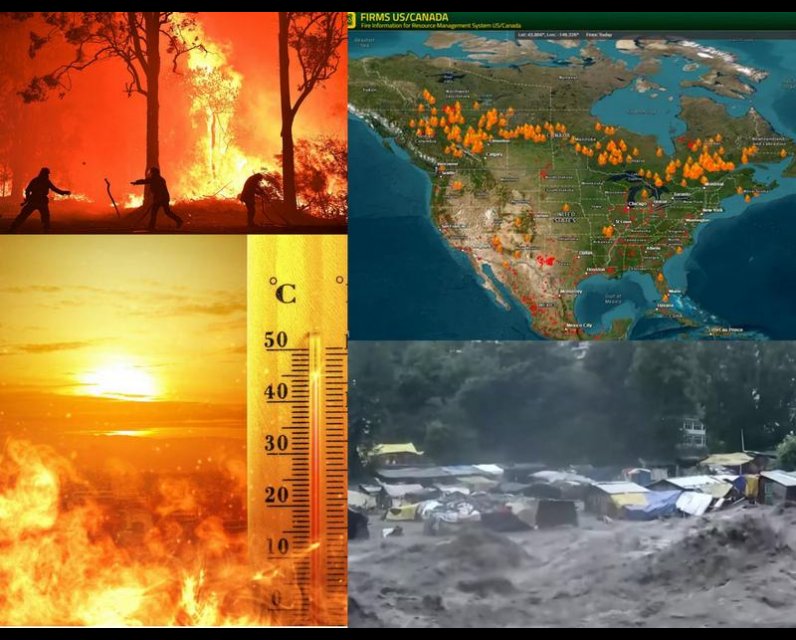Unpublished Opinions
Roland (Rolly) Montpellier is the co-founder and Editor of Below2°C. He’s a climate activist, a climate communicator and a blogger. He’s a member of Climate Reality Canada, 350.Org (Ottawa), Citizens’ Climate Lobby (Canada) and climate ambassador for We Don't Have Time. You can follow him on Facebook, Twitter, Instagram, Linkedin.
Are We Unable To Contemplate Our Own Destruction

We are watching climate change play out in real time on a planetary scale. "Our environment is burning. It's melting. It's flooding. It's depleting. It's drying. It's dying," says Volker Turk, UN High Commissioner for Human Rights evoking a "truly terrifying dystopian future". Daily reports on climate events are painting a pretty grim picture of what's to come when El Nino kicks into overdrive.
Inability to contemplate our own destruction
One might think that we have all the proof we need. Destructive climate breakdown is all around us. We're seeing unbearable heat waves, new high temperature records, almost unstoppable wildfires in Canada and Spain, biblical downpours in New York, flooding in Delhi. Extreme weather is fast becoming the norm. Despite this massive display of climate collapse, we're largely looking the other way.
Writing in The Guardian, columnist Jonathan Freeland asks "how can this be? How can we, like Nero, fiddle while the Earth burns"? We're in a climate emergency but not acting like it. We keep finding excuses to look away, a phenomenon well popularized by Don't Look Up, a movie where the world ignored scientific facts until it was too late, where human beings were unable to contemplate their own imminent destruction from a huge comet heading directly for earth.
Is it in our human nature to focus only on the immediate—the curse of immediacy—at our own peril? Or do we expect that the science and the facts will speak for themselves—that truth about climate will prevail? Freeland says that the answer lies elsewhere.
He argues that "the climate movement has the right answers but the words are all wrong." The fossil fuel industry is winning the climate propaganda war and winning over the general public by spending billions on marketing campaigns that plant doubt, misinform, delay, oppose action and water down climate policy.
A War of Words
Words matter! The narrative used by climate activists—global warming, climate change, climate justice—has not been loud enough to convey the clear message that we are in a very dire predicament. Our climate language has been too soft, polite, gentle, righteous and even soothing. I've often heard politicians in Canada say they don't want to cause panic and spread fear. Do they think that Canadians can't handle the truth? But it's quite the opposite. It's the public that has to wait for politicians to catch up to the rest of us.
According to Tzeporah Burman, if you're not terrified, you're not paying attention.
We need a wake-up call. We are facing an existential threat—fighting for our very lives. It doesn't get more critical than that. To combat this threat, activists and scientists must tell the truth about climate. And it's bad, very, very bad. Let's call it what it is: climate crisis, climate emergency, pollution, climate breakdown, climate chaos, environmental collapse, killer heat waves.
By spending billions on marketing since the Paris Agreement, the fossil fuel industry has shaped the climate narrative. The fossils got exactly what they wanted in Paris in 2015, a climate agreement which does not mention "fossil fuels" even once. We 'think' what the fossils want us to think about climate change and the transition to clean energy. The public is now being bombarded by the new terminology such as net-zero 2050, carbon capture and storage, decarbonization, offsets, sequestration, SMRs (small modular nuclear reactors), natural solutions, unabated emissions. emissions cap, green hydrogen, and more.
“We’re in a propaganda war, but only one side is on the battlefield,” says David Fenton, a public relations specialist long associated to progressive movements.
Canada: A Conflicted Public
A recent report, What do Canadians really think about climate change? shows Canadians do not have a strong understanding of climate change, its solutions or the barriers to their implementation. These are excerpts from the report:
Large portions of the public—typically one-third or more—simply do not know what to think about these topics, which is fertile ground for misinformation, conflicted public policy,and greenwashing. (This is exactly what the fossil fuel sector wants to see.)
Canadians have high levels of concern about climate change. Floods. fires, storms and heatwaves are increasingly linked to climate change in the public mind. About 70% say governments should be doing a lot more or somewhat more to address climate change (Lachapelle and EcoAnalytics, 2023).
Six in 10 Canadians (63%) either think Canada can continue to expand oil and gas production and reach net-zero, or are not sure (Lachapelle & EcoAnalytics, 2022).
There is significantly more support for growing clean energy than for oil and gas but almost 60% now say oil and gas will be important to Canada’s future economy, up from 41% in 2020 (Nanos, 2023).
Many Canadians continue to hold conflicting attitudes towards the energy transition and there is a widespread sense that we can have clean energy and go on burning fossil fuels, too.
Misinformation is a serious problem. In one recent survey, half of Canadians say they’re “not sure” whether solar panels cause more greenhouse gases during manufacturing than they end up saving. Communicators will encounter similar confusion about other key issues such as the environmental impacts of batteries and electric vehicles.
We Don't Have Time
Many Canadians say they simply do not know what to believe on many important questions. And too many continue to ignore the climate comet that is heading our way. Instead, we stand waiting, paralyzed by fear and unable to contemplate the life-ending forces that climate breakdown will unleash.
We don't have time to wait. Climate destruction is speeding up. Planet Earth has just experienced its hottest week ever. The temperature in Sanbao, China just hit an astounding 52.2°C (126°F).
In the end, it's not our human propensity to focus on the immediate at the expense of the longer term, nor is it our fear of the unknown that prevents us from contemplating our own destruction. It's the climate narrative and ambiguous messaging controlled by our governments, the oil and gas sector and the financial world that have created the powerful illusion that we're heading in the right direction on a path to net-zero. So we falsely believe that "we have the solutions", "we've got this." But we don't.
The challenge is mind-blowing but unavoidable says Bill McKibben:
"The next round of mobilizations has got to be bigger and it’s got to come soon; this week makes clear we’re in the gnarly rapids now, and hearing the roar of the waterfall around the bend." — Bill McKibben's July 16th Crucial Years Newsletter.



Comments
Be the first to comment